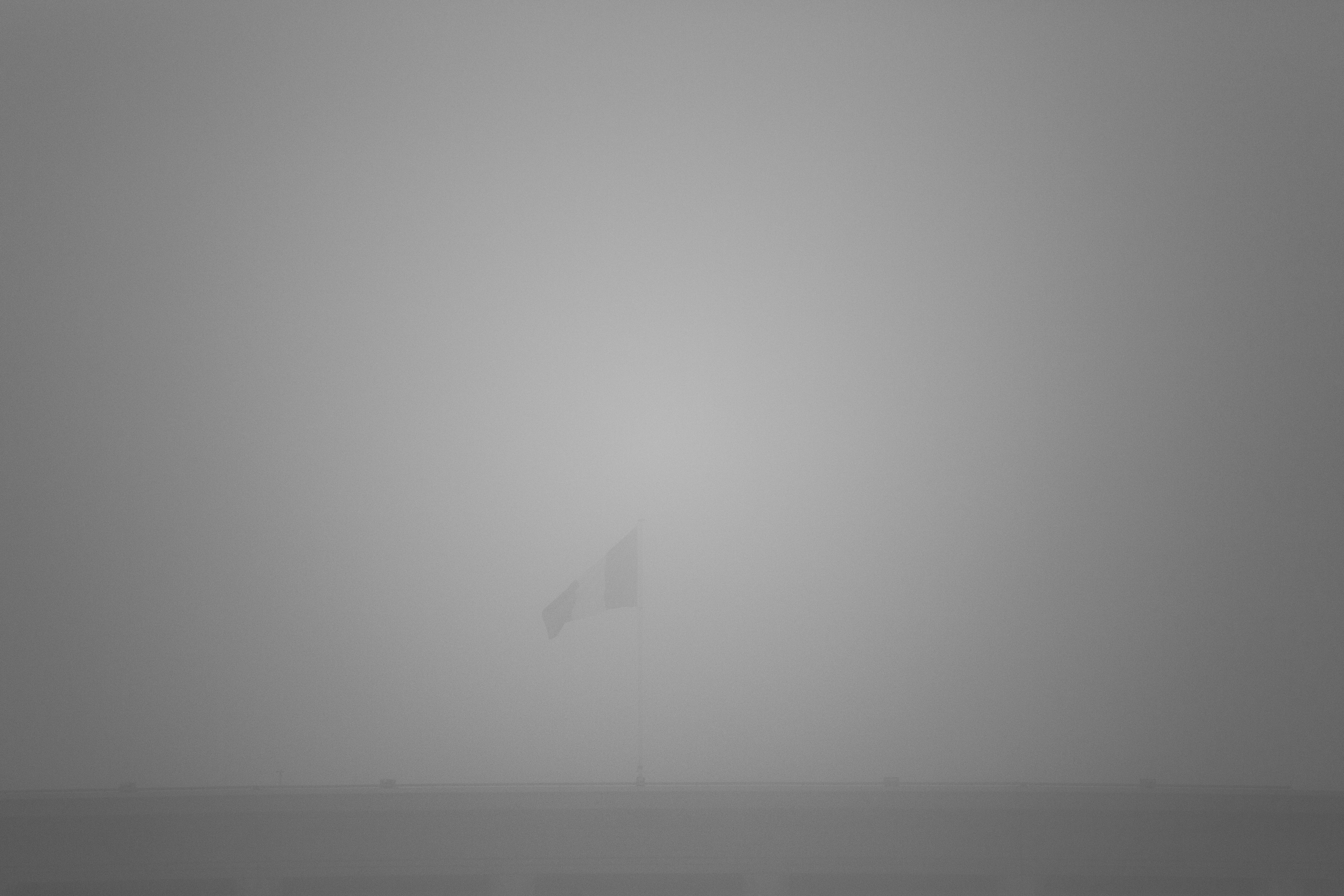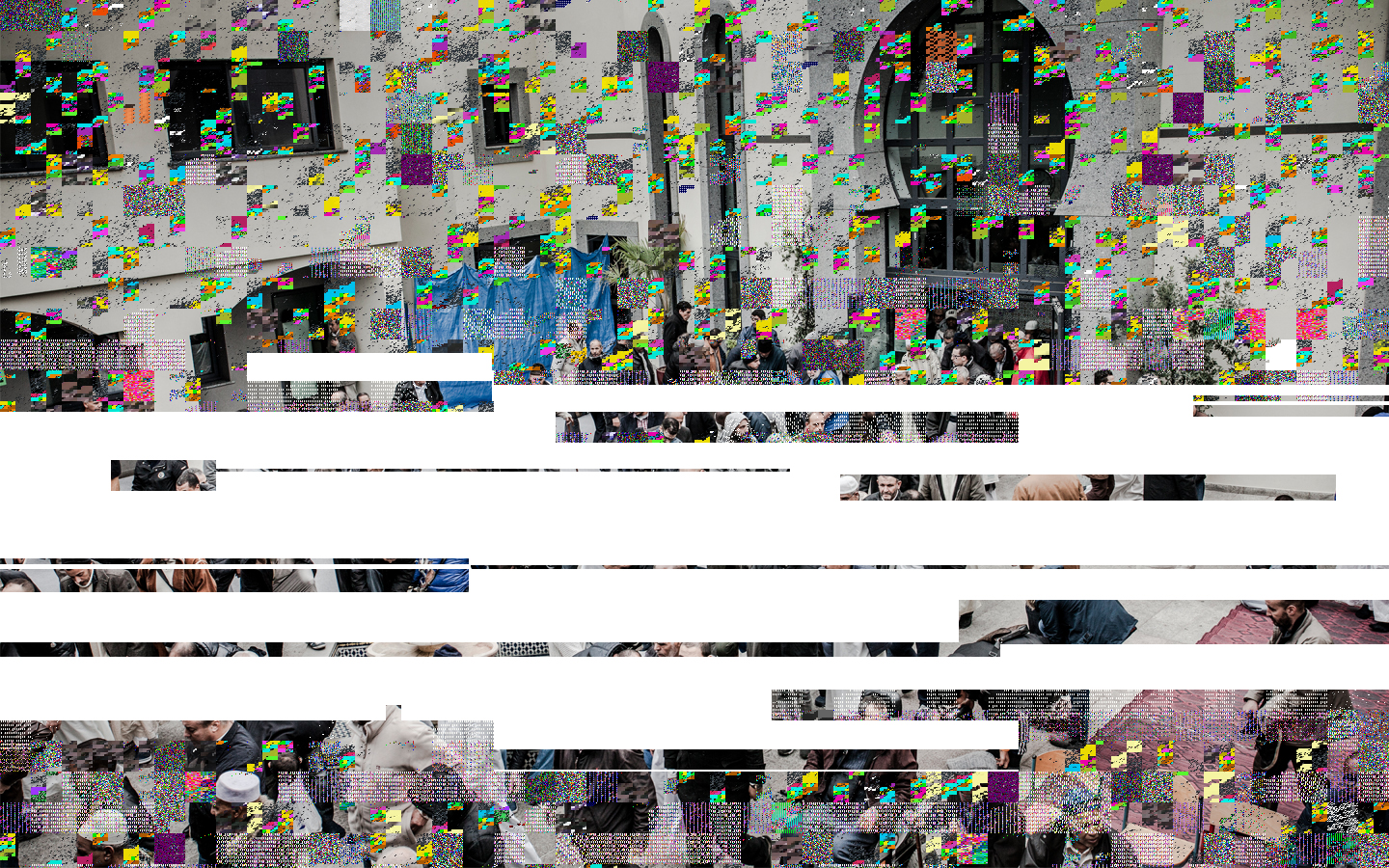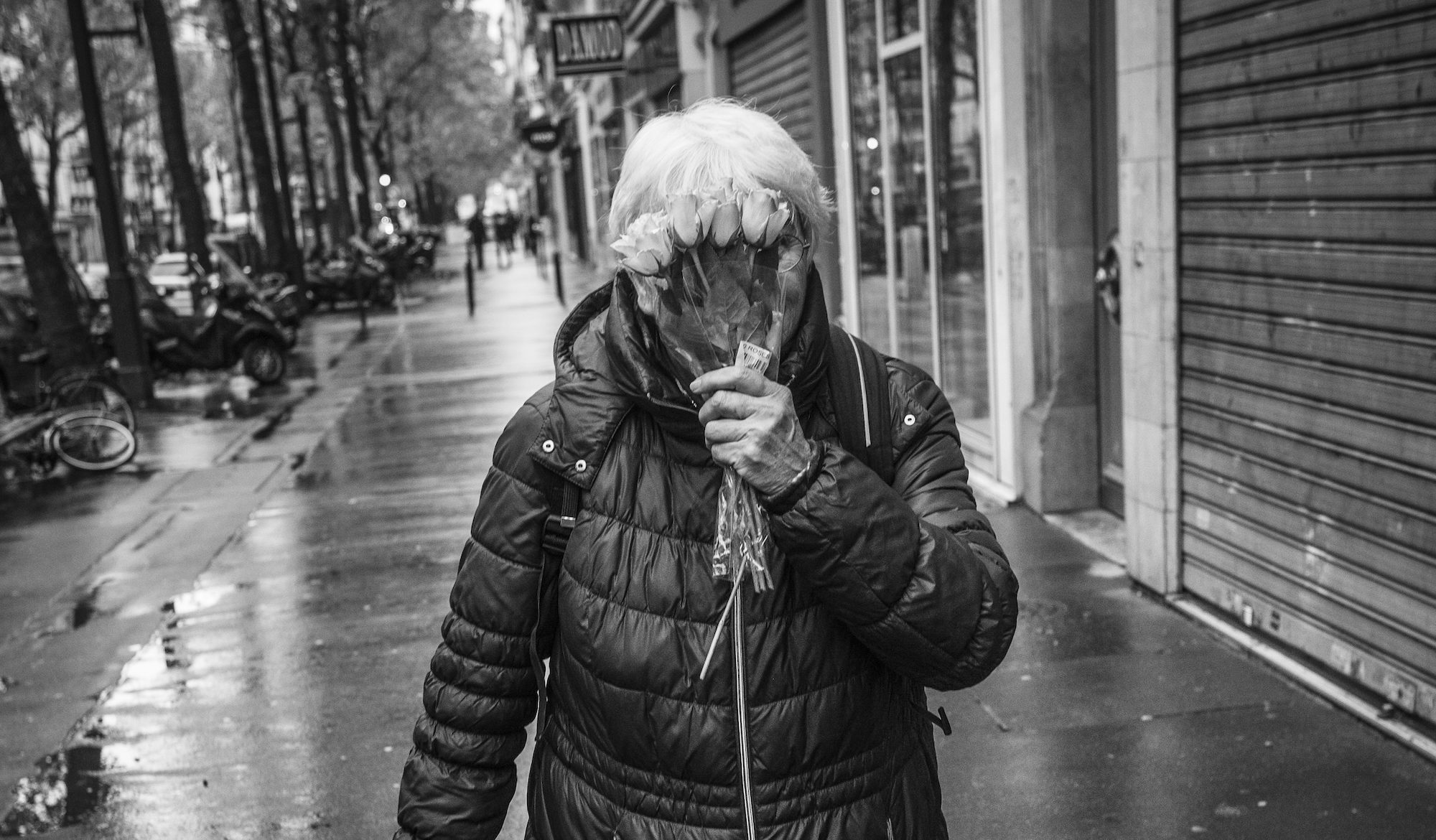The Crescent, The Cross, The Star, The Void
A conversation with photographer Oscar B. Castillo about photographing subjects on France's margins.

View of a French flag over the City Hall of Le Havre in northwest France where a rally took place demanding justice for the death of Abdoulaye Camara who was killed by ten bullets at the hands of police on December 16th, 2014. (Photograph by Oscar B. Castillo)
A conversation between Kali Handelman, editor of The Revealer, and photographer Oscar B. Castillo about his project “The Crescent, The Cross, The Star, The Void” created in collaboration with journalist Karim Baouz.
“The Crescent, The Cross, the Star, the Void” aims to be a journey inside the world of Islam in France and the many faces that compose this complex, multilayered reality built by long years of racial, political, cultural, and event spiritual issues. This project is a representation of the many paths followed by different sectors of the population and their intersections. It looks to better understand the relationships between the different actors in today’s fractured France. Through audiovisual mixed media documentation made of traditional photojournalism, still lifes, intervened images, portraits, and some other documentary approaches, the project looks to put together, in a personal way and in an interactive website, lives and stories many times seen as parallel, in order to contribute to the construction of a more auto-critical, inclusive, and self-aware society. – Oscar B. Castillo
Revealer: How did issues such stigmatization, stereotypes, immigration, marginalization, secularism, Islamophobia, radicalization figure into how you conceived of this project.
Castillo: It is exactly a mix of those issues that drew me to this project. But I think I have a special interest in how society deals with youth from underprivileged communities, mostly because they are immigrants. The marginalization they sometimes endure feeds into all kinds of social ruptures that may result in internal and external conflicts that are not always religious, but that have, as in the French case, an important religious aspect.
Revealer: What is that “religious aspect” in the French case?
Castillo: France’s colonialist past continues to affect its current relationships with many of its former colonies; it is hard to overcome and forget that kind of exploitative dominance. And some of these countries are also where generations of Muslim immigrants have come from. This mix of factors: Colonialism, immigration, race, and religion has created a French society with many sharp edges. Social acceptance is now is like a scale, and being a Muslim in France will weigh heavily on the possibilities for integration.
Revealer: How did you find your subjects for this project? What did they think about being a part of it? Was it different in any ways from finding subjects for past projects? Does explicitly focusing on religion change the feeling of things?
Being an outsider in some way was helpful. There was a mutual interest as they were generally curious about me as someone who was not linked to the Muslim community or a religious movement but was looking for a better understanding of their lives, their particular situations, and how they are coping. Some of them were open and glad to collaborate with me on the project, but were limited by some religious precepts and interpretations. It is also a sensitive topic that can make discussion and the exchange of ideas difficult, as some dogmatic visions may not accommodate questioning where the mere insinuation of a doubt could be taken as an offense.

Young members of Muslim and Jewish communities light candles and sing typical Jewish songs of celebration to close an inter-religions meeting to discuss cultural and religious aspects and facilitate better understanding and dialogue between the two communities. (Photograph by Oscar B. Castillo)
Revealer: Who or what were some of the most interesting subjects to photograph?
Castillo: I was trying to move towards subjects who were interesting to me in all kinds of ways, so the photographic side of it, in general, was secondary. Of course, I love and look for visually interesting scenes, but it is not my main motivation. I go to see, hear, smell, feel, know, talk, understand, and then, sometimes, the pictures come. For example, I loved participating in inter-religious activities with Jewish and Muslim kids. Getting to see them learning about each other and their different cultures and their many similarities was an important experience. Similarly, getting to know a young Muslim woman and hearing her speak about feminism, education, liberation as well as spirituality and beliefs was a very good learning experience.
Revealer: What are some of the techniques that worked well?
While always respecting the dignity of the subjects sometimes I like to confront them and discuss their contradictions (or mine). For example, a member of the Salafi community told me that, religiously speaking, videos were allowed but not the photography so then I started to wonder about animated GIFs. Are there some precepts or some interdictions about GIFs?
In this work I’m trying to use both the technical and aesthetic approaches to work in relation to those kinds of questions, doubts, and feelings. Some may come out of fun and some from more difficult moments like when some subjects asked me to delete photos I had made of them off of my camera. In response, I recovered the files, which had become corrupted, and distorted them further. I included those images in order to talk about fear and about how distorted representations can disrupt the conversations we use them to guide.

Intervened file recovered after being forced to delete the picture by a group of men at the Mosque in the Genevilliers area of Paris, France. (Photograph by Oscar B. Castillo)
Revealer: Where did the project name come from? What is “the Void”?
Castillo: The name is a reference to the symbols that represent the largest monotheistic religions. Each can be used to celebrate diversity or create division. “The Void” is that place in the middle that is unknown, rarely discussed, and is under-appreciated. It could be a neutral zone or, even better, an area of convergence and respect, but it is instead a place where we throw our fear, intolerance, and ignorance.
Revealer: How has the project evolved as you have been working on it?
Castillo: As the project grew, we were able to narrow down our focus. This is not to say that all the subjects we worked on are equally relevant or that we included all the leading actors, but as we went deeper into the issues and the work on the ground, we were able to identify these characters, where their actions were taking place, and their influence on and relation to other characters in the story. Each person led to a new set of characters and situations, creating new links with other elements of the story that were not evident since the beginning.
Revealer: How have you structured the final project to reflect those connections? Is that part of the organization of the website?
Castillo: The project is a journey inside those connections, and how these different characters and their particular stories interact and build together the bigger frame. We want the website to be an interactive place where the reader can take a trip inside these stories. I don’t want to dictate one singular way to connect the links between them. Instead, my version is just one of multiple possible ways to connect them and is based on my own experience travelling inside this specific universe. It is not the whole experience but aims to be as vast as possible and aims as well to continue growing.
Revealer: What was it like collaborating with your writing partner for this project, Karim Baouz?
Castillo: It was an interesting experience as I was collaborating with somebody that knows the subject personally and has experienced this story in his own life, not just from his years of studying it. His experience as an underprivileged youth, his familial background, and his work as legal assistant, among many other personal intersections, allowed him to be more than a spectator and relate to the subjects in our story on a different, and more intimate level along with his expertise.

A french woman covers her face at the commemoration of the terrorist attacks in Paris on November 13th, 2015. The woman was having a discussion with Karim Baouz, my collaborator, about the war in Algeria and was not listening to any of Karim’s opinions because of his Algerian origins. (Photograph by Oscar B. Castillo)
Revealer: What did it feel like to be working on this project as the elections in the US and France were happening?
Castillo: It is important and illuminating because working during this specific time gives you a temporal and historical framework for relating seemingly isolated issues to a more collective behavior. Some actions or ideas (perceived as positive or negative) may seem like just the position of a particular individual, but they take on a whole new meaning when they supported and shared by millions of people.
When those ideas are extreme and move towards separation, confrontation and hatred, when they are blindly supported by brainwashed parts of society, it benefits only a small group, and it is important to think about them as part the bigger picture. This work aims to show that there are no simple connections, there are more than just cause and effect relationships, and that this is all happening in the context of racial, religious, political and socio-economic issues part of a cycle of decisions made by local powers that have global repercussions.
Revealer: Can you tell me about how this project is personally relevant for you? What does it mean to you to engage with these issues?
Castillo: There are two levels of the personal implications of this project that are completely intertwined, to say the least. On one side there is this curiosity about how social fabric is built, or destroyed in many cases, and how societal relations function differently depending on social class, national origins, religious practices, or political affiliations. On the other side, there is this sense of belonging, in some weird but concrete way, to French society. I have lived in France intermittently for years and have family connections there, so I have been witnessing and feeling the increasing gap within their society and the fast and aggressive ways it is disrupting everyday life. At this point, the fear that my son will live in a very fragmented place pushes me to try and portray honest and useful reflections about how these issues are happening and how they may be improved or, at least, better understood.

Portrait of an unknown man on his way to assist for the Friday prayers at the Great Mosque of Paris. (Photograph by Oscar B. Castillo)
Revealer: How has being a parent in France influenced your perspective? Are there images you made from that point of view?
Castillo: Many times we as photojournalists or documentary photographers work on subjects and stories that are not linked to our lives in ways that touch us beyond our curiosity or some general interests. By that I’m not talking about lack of implication with the subject (that is another very important discussion too). What I mean is that it is very different to work on subjects that you feel are affecting your life and lives of your personal circle in a more direct way. There are some images that didn’t make it into the final edit of this project which were related to a well known Christmas market in Alsace. I made them when the mother of my son told me they were going to visit that market on the same day that the attack on Berlin’s market took place. Those kinds of situations bring together your personal life and circle, your reflections about a context, your work and how all that become a whole have a very important influence on my approach to this project; I’m seeing and reflecting on this situation but my son is living it and growing inside of it.
Revealer: Who do you hope will see this work? What would you like them to take away from it?
Castillo: I think this project may be useful for people who would like to read about France’s socio-political panorama and the religious views that are part of it through a freer lens that mixes a serious and respectful analysis with a more ludic and personal approach. An array of people would be able to find some points of reference or similarities to their own environment and relate to the interesting details about the subjects of this project, their interrelations and how they are affecting the collective life of France today.
I would like readers to understand that questioning the norm is important, that doubts are natural and necessary and that the discussion of every topic is paramount for understanding each aspect of society. The only sacred things should be the freedom of choice and the respect for one another. I hope this work contributes to that discussion.
***
This conversation was part of a collaboration between photographer Oscar B. Castillo and journalist Karim Baouz with support from the Magnum Foundation‘s “On Religion” project.
For more of this project, see “Debate and Turmoil within the ‘French Muslim Community’” by Karim Baouz and “Images of the Void” by Elayne Oliphant.
***
Oscar B. Castillo was born in Caracas, Venezuela in 1981. After studying psychology at Venezuelan Central University the thirst for adventures put him early on the road, meandering for years through many streets all over Europe until photography took him back to formal education in Barcelona – Spain. His professional work as photographer has been geared towards social subjects that promote ideas of solidarity, tolerance and respect and at the time question both the structures of economic and political power and himself as photographer and as part of this society. In his words “I’m not looking to carry on with a militant work, I just aim for the camera to be a coherent extension of my vision of humanity out of photography.”
Oscar has been working for the last years on a long term project about the causes and consequences of violence in his home country and its relationship to the political fracture Venezuela currently endures. His work has been published in TIME Magazine, the New York Times, International New York Times The New Yorker, L.A. Times, Neue Zürcher Zeitung, Foreign Policy, Der Spiegel, L’Internazionale, LFI Leica Magazine, La Vie Magazine, Days Japan and other different major international publications and exhibited in France, Germany, Italy, USA, Spain, Cambodia, Lithuania, Colombia. He is a 2016 Magnum Foundation Grantee for his work about the situation of Islam in France as well as a 2016 winner of Eugene Smith Fellowship. Parallel to his photographic work Oscar developed a passion for teaching, being photography as well an important tool for education, inclusion and social improvement. As instructor and teacher he has been sharing his photographic and social points of view in participatory photographic workshops with kids from excluded communities in Mexico, youngsters in IDPs camps in post-earthquake Haiti or inmates inside Venezuelan prisons. He has also taught in formal educational programs in Colombia, Argentina, Venezuela and elsewhere. Oscar has been participating regularly at Foundry Photo Workshops, first as student in Mexico and India, later as assistant in Argentina and Bosnia, and finally as an instructor in Guatemala.